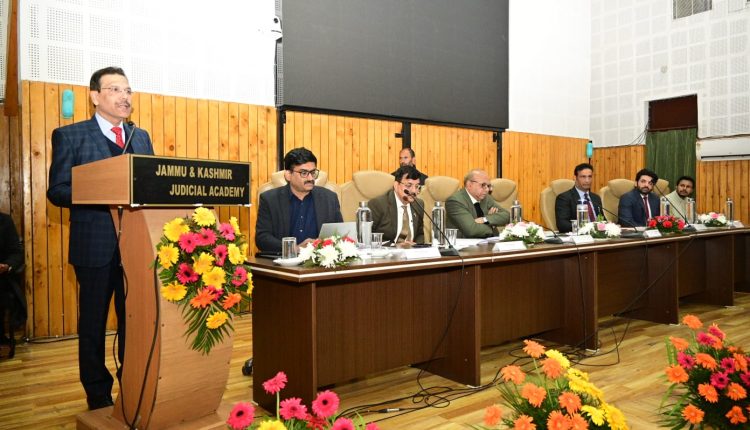The Jammu & Kashmir Judicial Academy, Srinagar, in collaboration with the Wildlife Trust of India (WTI), on Saturday organised a one-day workshop on wildlife protection laws for judicial officers of Kashmir Province and the Union Territory of Ladakh. The programme was held under the patronage of Hon’ble Chief Justice Arun Palli, Patron-in-Chief of the Academy, and the guidance of the Governing Committee.
The event opened with a welcome address by Mr. Naseer Ahmad Dar, Director of the Academy, who underscored the constitutional mandate under Articles 48A and 51A(g) to protect the environment and wildlife. He stressed the ecological fragility of Jammu & Kashmir and the increasing challenges posed by illegal wildlife trade, calling for stronger enforcement and greater judicial sensitivity.
Dr. Tanushree Srivastava, Senior Manager and Head of WTI’s J&K Unit, delivered the introductory remarks, outlining the workshop’s objectives and emphasising the need to strengthen institutional capacities for combating wildlife crimes.
In his keynote address, Hon’ble Mr. Justice Rajesh Sekhri, Judge of the High Court of J&K and Ladakh, highlighted the growing threat posed by wildlife offences in the region. He urged judicial officers to adopt a proactive and consistent approach to enforcing wildlife protection laws in order to safeguard the region’s delicate ecological balance.
Technical Session I was led by Mr. Jose Louies, Chief of Enforcement and CEO, WTI. He traced India’s deep cultural legacy of wildlife conservation, citing symbols such as the Ashokan Lion Capital, and discussed the primary drivers of the illegal wildlife trade. He pointed to the increasing sophistication of poachers and the challenges this poses for detection and enforcement.
Hon’ble Mr. Justice Sunil B. Shukre, Former Judge of the Bombay High Court and Chairperson of the Maharashtra State Commission for Backward Classes, delivered a guest lecture focusing on the Wildlife Protection Act, 1972. He explained the Act’s conservation-centric approach and referred to key Supreme Court judgments, highlighting the use of the “broader probabilities” standard in wildlife cases given the evidentiary challenges of crimes committed in remote areas.
Technical Session II, led by Advocate Mr. Lovish Sharma, offered an overview of the structure and schedules of the Wildlife Protection Act, along with significant provisions and landmark case law shaping contemporary wildlife jurisprudence.
In Technical Session III, Mr. Darak Ullah, Former District & Sessions Judge, Assam Judicial Service, discussed the judicial approach to ensuring successful convictions under wildlife laws. He focused on evidentiary evaluation, statutory presumptions, and the role of compensation, drawing on his judicial experience to illustrate practical solutions to common challenges.
Technical Session IV was conducted by Mr. Biswajit Saika of the Wildlife Crime Control Bureau (WCCB). He demonstrated wildlife article identification techniques, showing how agencies distinguish genuine wildlife derivatives from synthetic materials and document seized items for prosecution. The session offered judicial officers a firsthand understanding of investigative procedures.
The workshop concluded with a vote of thanks by Mr. Jose Louies, who acknowledged the contributions of the resource persons, the Judicial Academy, and participating officers.
Marked by interactive discussions, practical demonstrations, and expert insights, the workshop reinforced the Academy’s commitment to equipping the judiciary with the knowledge and tools necessary to address wildlife crimes with competence, consistency, and ecological awareness.


Comments are closed.